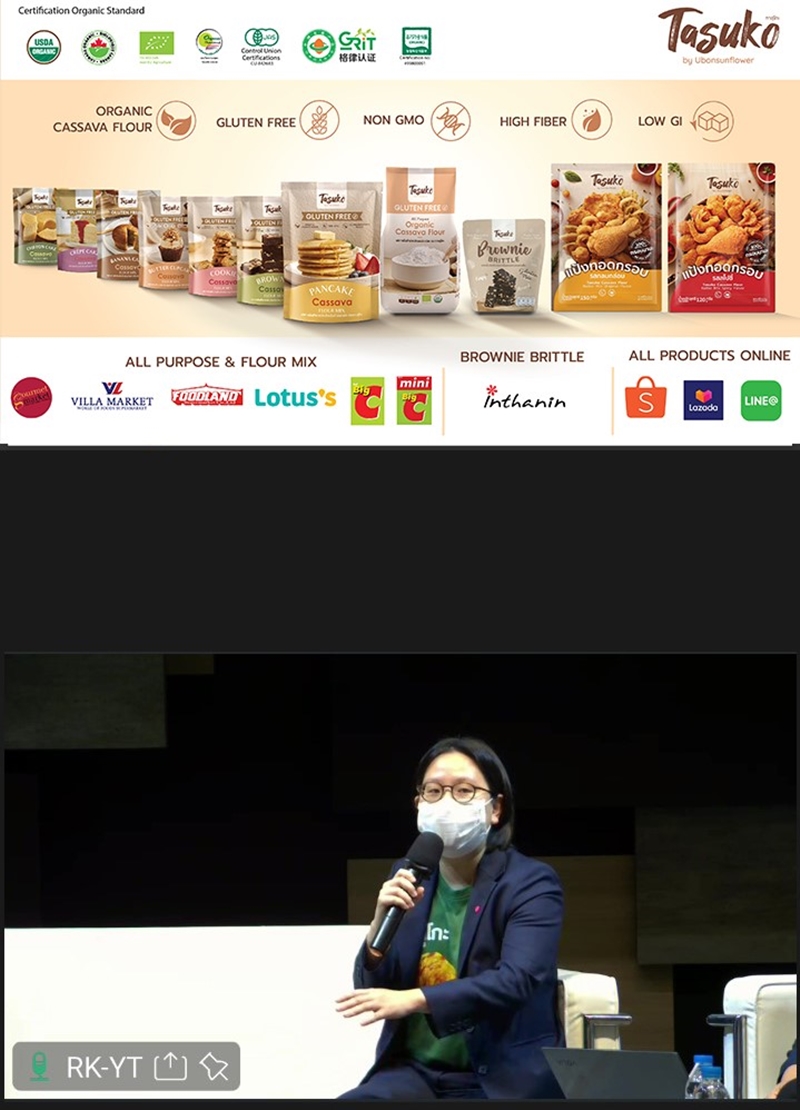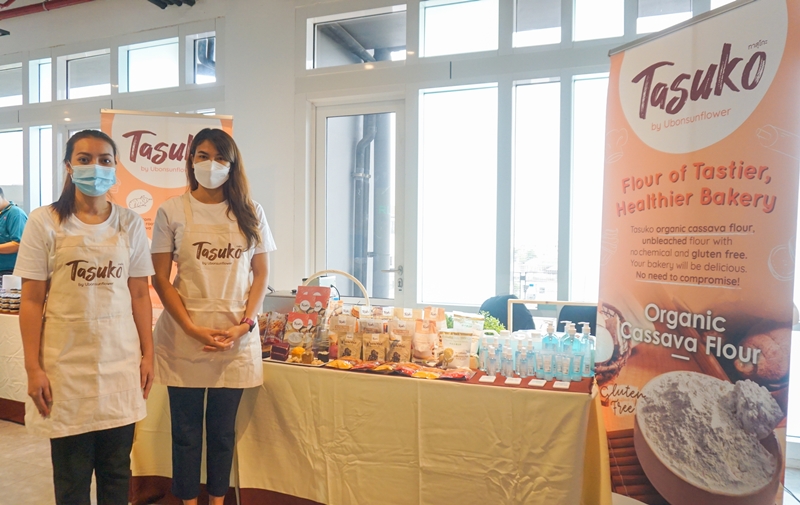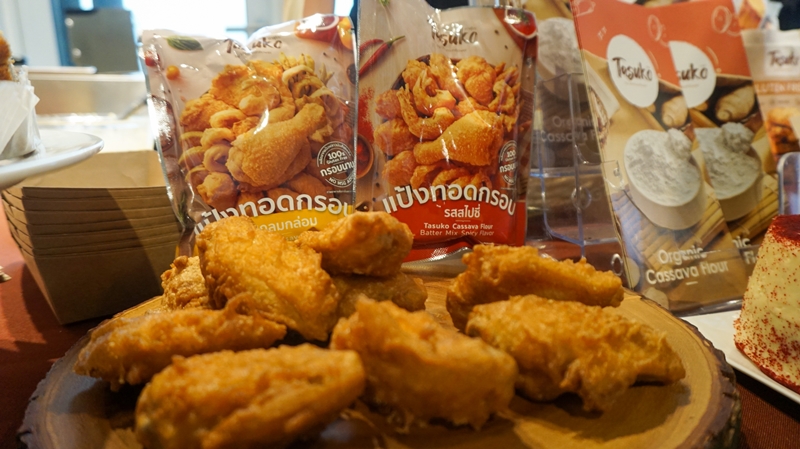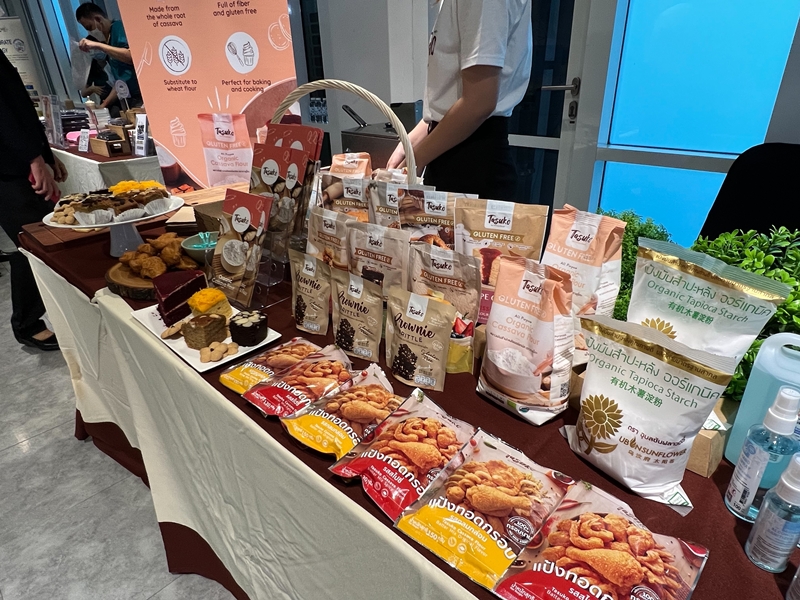UBE participates in a discussion about flour with NSTDA.

Presenting cassava flour as a solution to the raw material import crisis for the future food industry.
UBE by Ms. Sureeyot Khowsurat, President (4th from right), joined as a speaker to share experiences at the seminar 'Wheat Crisis and Its Impact on Thailand: Opportunities and Challenges of Cassava Products to Replace Grains.' The seminar discussed organic cassava flour as an alternative raw material for developing various food products to substitute wheat flour during price fluctuations. This helps entrepreneurs reduce costs while meeting the needs of health-conscious consumers and those with gluten allergies. The seminar featured expert speakers including Mrs. Anong Paichitprabhaporn, Director of the Food Institute Ministry of Industry, Dr. Weerawat Lertwanawattana, Managing Director of Siam Modified Starch Company Limited, and Asst. Prof. Dr. Natthiya Buensantia from Suranaree University of Technology. It was organized by the National Science and Technology Development Agency (NSTDA) on Monday, August 29, 2022, from 9:00 a.m. to 12:00 p.m. at the Auditorium Meeting Room, 7th Floor, KX Building."
Ms. Sureeyot Khowsurat, Managing Director of Ubon Bio Ethanol Public Company Limited or UBE, the largest well-integrated tapioca player in the northeast region of Thailand using cassava roots as raw materials said that the company sees opportunities arising from the rapid growth of the international cassava market and the increasing awareness of consuming healthy, chemical-free foods that prevent various diseases. Leveraging its expertise in utilizing cassava raw materials, the company focuses on developing high-quality cassava products, starting with quality raw materials. This is achieved by promoting farmers through the integrated Ubon Model operations in collaboration with government agencies. The goal is to help farmers reduce costs and increase productivity by cultivating organic cassava certified to international organic standards. Currently, the Ubon Model has expanded to 'Lower Isaan 2 Plus Innovation,' covering Ubon Ratchathani, Yasothon, Amnat Charoen, and Sisaket provinces. This expansion is in partnership with the National Science and Technology Development Agency (NSTDA), the Thailand Institute of Scientific and Technological Research (TISTR), the Department of Agricultural Extension, and the Department of Agriculture. These collaborations bring production innovations such as biological products, production factors, and machinery to enhance the efficiency of organic cassava production. In the future, an agricultural innovation network will be established to further integrate efforts and find ways to support cassava farmers. Additionally, UBE utilizes raw materials processed from organic cassava to develop value-added products through various research projects. One such project, in collaboration with NSTDA, focuses on producing organic cassava flour for use in bakery products. The company's research and development department will further refine this cassava flour into various bakery recipes. Another research project, in collaboration with Ubon Ratchathani University, explores the application of cassava flowers in products such as meat, frozen food, baby food, and snacks.".
“Ubon Sunflower Company Limited (UBS), a subsidiary of UBE, is considered the leading manufacturer and distributor of cassava starch and cassava flour Gluten-free and recognized as the world’s leading manufacturer and distributor of organic starch, UBS will continue to develop flour from farmers' cassava to serve as the carbohydrate of the future, meeting the needs of both B2B and B2C customers by incorporating it into a variety of new products. This development adds value to gluten-free alternatives for health-conscious consumers. Additionally, due to past restrictions on importing products, entrepreneurs reliant on imported raw materials have been affected. Cassava flour, therefore, can serve as a substitute ingredient in bakery products and foods requiring sticky, moldable dough properties. To support the increasing market demand, UBS has invested in enhancing efficiency and expanding the production capacity of Flour Line 2 from the original 100 tons to 300 tons per day, or 90,000 tons per year. This expansion aims to foster a more circular economy within the country,” Ms. Sureeyot said.
In addition to focusing on product development, the UBE Group places a strong emphasis on sustainable business operations aligned with the BCG Model, aiming to create shared value across the economy (Profit), society (People), and the environment (Planet). This commitment reflects the company's sustainable development policy, ensuring sustainability in every aspect. By employing biological production technology, UBE recycles energy from waste to reduce reliance on external energy sources and is dedicated to energy conservation, thereby aiming to mitigate greenhouse gas emissions. Furthermore, UBE adheres to principles of corporate governance, prioritizing the interests of stakeholders throughout its supply chain. This holistic approach ensures that organizational development progresses hand in hand with social and environmental responsibility.






